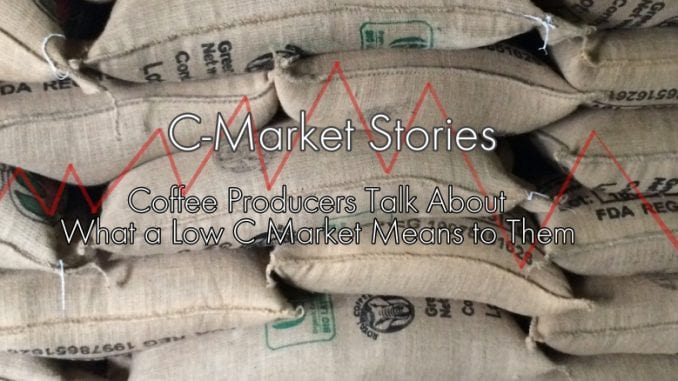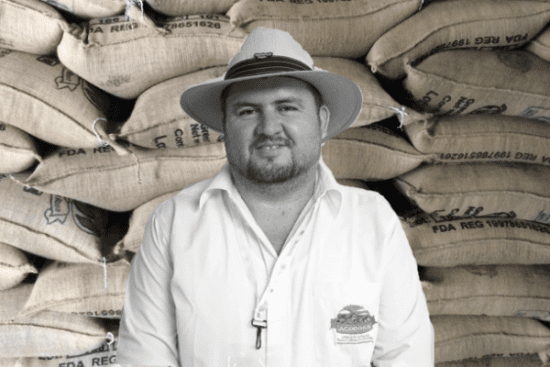
In this series on Barista Magazine Online, coffee producers talk about what a low C-market price means to them.
BY KENNETH R. OLSON
BARISTA MAGAZINE
Earlier this year, the global commodity market for coffee fell to a 12-year low, dropping below $1.00/lb., which in many cases is below the cost of production for coffee farmers. At the World Coffee Producers Forum in September, Roberto Velez CEO of the Colombian Coffee Growers Federation (FNC) said, “It is today a desperate moment for the 25 million coffee growers around the world. It is a crisis beyond imagination.”
At the same event, Rene Leon Gomez, the executive secretary of Promecafe, which is based in Guatemala and represents many Central American coffee farmers said, “I would say millions of producers in the region are desperate right now. A lot of farms are being abandoned, social conditions have deteriorated.”
With these dire warnings in mind, and with the well-being of coffee farmers and the future of our industry weighing heavily on our hearts, we wanted to talk to some specialty-coffee producers from around the coffee-growing world and ask them what a low C market means to them, how it affects their farms, and what kind of an impact the collapsing C has on their communities.
We have more coverage on the C market in the December 2018 + January 2019 Issue of Barista Magazine; Chris Ryan writes about the C market and why it’s important even to specialty producers in “A Volatile Presence: Understanding the C Market and How It Works.”
In this series, we hear directly from coffee producers about how the low C impacts them; in this installment, we talk with Felix Camposeco from Guatemala.

Felix Camposeco is the general manager of production for Acodihue, an organization representing 18 co-ops in Huehuetenango, Guatemala, with more than 7,700 members. The coffee has earned certifications from Fair Trade, CAFE Practices, and Rainforest Alliance. We spoke with Felix at Let’s Talk Coffee in Cartagena, Colombia, where the collapsing C market was a big topic of conversation.
Here’s what Felix had to say when we asked him about how the low C market impacts the members of his cooperative. “It affects the members directly because producers depend 100 percent on coffee for income,” he shares. “They have one harvest per year, and they have to see it at an adequate price to meet the needs of their farms for planting, for their health, for their food, for their whole lives.
But the impact is felt beyond coffee producers. Coffee is the single-most economically important crop in Huehuetenango, says Felix, and when farmers lose out on income, so does everyone else in the community. “All of the community depends on coffee,” Felix says. “Those who don’t produce coffee work as employees on coffee farms. But when the price goes down, the farmer can’t pay others to work. The family chooses to work for themselves [instead of hiring labor], but [the end result is that] they’ll leave coffee on the tree to dry.
Felix continues, “When prices are good, they can do a selective harvest with three passes on each plant. But when the prices fall, the farmer will do one pass, stripping the tree, and producing a lower quality.”
Ultimately, Felix says the pressure of a low C market means coffee quality can also suffer, even though higher-quality coffee can bring better prices, because the farmers simply cannot afford to do the best-practices techniques to create higher-quality crops.
“When the price is low,” he says, “quality goes down.”
Felix says that certifications (and the price premium that goes with them) do offer some protection against a falling C market. And he says bluntly, “It would be a dream come true to be able to do business outside of the C market. The producer gets squeezed when the market goes down, but also when it goes up. The one who gets choked all the time is the producer.”
It’s also difficult, Felix says, to have so much of their community’s economic well-being tied up in something as abstract and completely outside of their control as the C market. He says, “It’s frustrating for small farmers to know that the price paid is according to someone else’s perception, someone who will never know the coffee. The producers want the ability to put their own price on a product and sell it for what it’s worth.”
Again, he says plainly, “If you want something good, you should pay for something good.”
Asked what message he would have to specialty coffee professionals who aren’t interested in commodity coffee and pay above C market for higher quality lots, he responds, “If one link in the supply chain is being forced hard in a crisis, that link could be smashed, and it will affect what will be available in the future.”
He also says that it’s important for people to know that the affects of a falling C market quickly spread and can result in far more damage to the community and the environment than is obvious at first.
“Another pressure from the low C market,” he says, “is [that it] causes immigration. Producers will take their kids and head for the U.S.” Unfortunately, at this time, that might only bring them more pain and disaster than they expect.
And Felix says, “The producer doesn’t only make coffee, they also generate oxygen. They’re processing and cleaning the environment of CO2. The producers ultimately invest in projects to help protect natural resources. If the price drops, those investments and that work will stop. There’ll be more deforestation because people will cut firewood for extra income. Birds and animals will be killed for food.”
Felix says when we see the C market hit modern lows, we should keep in mind that, “The low price of coffee is not just paying someone less for coffee. There are a lot of things behind it, and tied to it. If you have a good coffee price, you can invest in the farm, but when it’s so low, you can’t invest; you have to struggle just to survive.”

